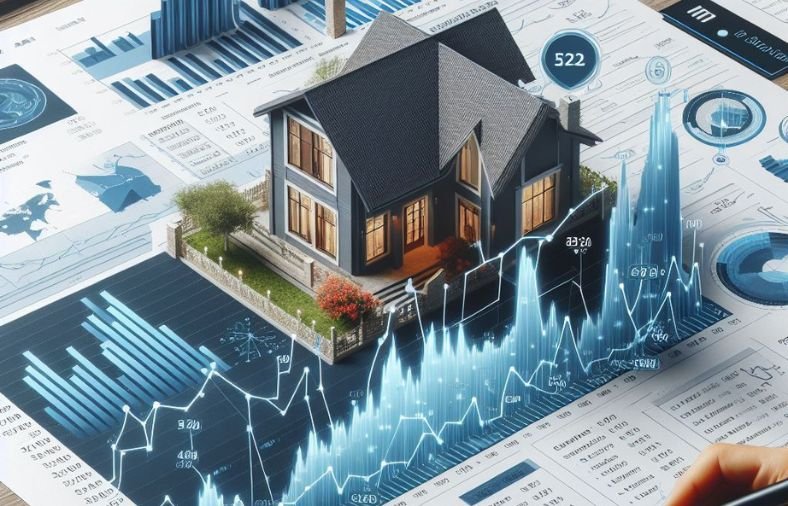
The real estate market is one of the most dynamic sectors, constantly shifting due to economic forces, interest rate changes, and shifts in buyer behavior. As we move into 2025, both buyers and sellers are searching for insights into what the future holds. Will housing prices continue their upward trend, or are we heading toward a market correction? Are mortgage rates going to stabilize or increase further? These are pressing concerns for anyone planning to invest, sell, or relocate in the coming year.
Understanding the real estate market in 2025 is crucial, as various economic indicators point to changes that could redefine homeownership and property investment. Market trends from 2024 provide valuable clues about the direction of real estate, and potential shifts in demand and supply could impact affordability and sales activity. With the influence of government policies, economic growth, and emerging technology, both residential and commercial real estate are expected to see significant developments.
This article provides a deep dive into real estate market predictions for 2025, offering expert insights for buyers, sellers, and investors. By examining economic trends, interest rates, rental market dynamics, and global influences, we aim to equip you with valuable information to make informed decisions. Whether you are looking to purchase your first home, sell your property for maximum profit, or invest in a growing market, this comprehensive guide will help you navigate the real estate landscape with confidence.
1. The Current State of the Real Estate Market in 2024

Recap of Market Trends in 2024
The real estate market in 2024 experienced significant fluctuations, with some regions cooling down after years of rapid growth. Home prices in major metropolitan areas remained high, but demand in suburban and rural markets saw a slight decline. This shift was driven by economic uncertainty and affordability concerns, causing some buyers to delay their home purchases.
Additionally, housing inventory remained low, leading to competitive bidding in some areas. However, with increasing construction and new listings entering the market, housing supply showed signs of improvement toward the end of the year. These factors laid the foundation for what we might see in 2025’s real estate trends.
How Interest Rates Affected Buyers and Sellers
Mortgage rates in 2024 were one of the biggest challenges for buyers. Higher borrowing costs limited affordability, forcing many to reconsider their purchasing plans. Sellers, on the other hand, had to adjust their pricing strategies to attract buyers, leading to price reductions in certain markets.
The Federal Reserve’s decisions on interest rates played a crucial role in market activity. If rates remain high in 2025, demand may continue to be restrained, but a decrease could reignite homebuying enthusiasm.
Regional Variations in Housing Markets
Not all markets behaved the same way in 2024. Some cities, like Austin and Phoenix, saw price corrections, while others, like Miami and New York, continued to attract high-value buyers. The impact of migration trends, job opportunities, and remote work options influenced regional differences, and these factors will continue shaping 2025 real estate market forecasts.
2. Economic Factors Shaping the 2025 Real Estate Market

The Impact of Inflation and the Economy on Housing
Inflation remains a key factor affecting the real estate market in 2025. When inflation rises, home prices and mortgage rates typically follow suit, making affordability a concern. However, if inflation slows, we could see relief for buyers, leading to a more balanced market.
Economic growth, employment rates, and consumer confidence will also dictate how the market performs. A strong economy will encourage home purchases, while economic slowdowns may lead to cautious decision-making.
Mortgage Rate Predictions for 2025
Experts predict that mortgage rates may either stabilize or decrease slightly in 2025, depending on the Federal Reserve’s policies. Lower interest rates would improve affordability, potentially leading to increased home sales. On the other hand, if rates stay high, buyers may continue to delay purchases or opt for adjustable-rate mortgages (ARMs) instead.
Government Policies and Their Influence
Tax incentives, first-time homebuyer programs, and zoning laws will play a role in shaping real estate trends in 2025. Any government interventions to increase housing supply or regulate the rental market could significantly influence home prices and investment opportunities.
3. Will Home Prices Rise or Fall in 2025?
Experts’ Predictions on Home Price Trends
Market analysts remain divided on whether housing prices in 2025 will rise or correct. Some believe that limited inventory will continue to push prices up, while others argue that economic uncertainty could lead to a stabilization or slight decline.
Factors Driving Price Increases
Demand from millennials and Gen Z homebuyers, supply shortages, and job market strength are key drivers that could keep home prices elevated. If construction fails to keep pace with demand, prices will likely remain high.
Potential for Market Corrections
In markets that experienced overvaluation in recent years, some price corrections may occur. Cities that saw rapid appreciation, such as Los Angeles and San Francisco, could see slight downturns as affordability pressures push buyers elsewhere.
4. What Buyers Should Expect in 2025
Is 2025 a Good Year to Buy a Home?
For buyers, 2025 real estate predictions suggest that market conditions will be highly dependent on interest rates. If rates decrease, purchasing power will increase, making homeownership more accessible.
Navigating High-Interest Rates or Falling Prices
If rates remain high, buyers will need to be strategic in securing financing. Adjustable-rate mortgages (ARMs) or seller concessions may become common negotiation tactics.
First-Time Homebuyer Tips for 2025
First-time buyers should explore government-backed loan programs, such as FHA and VA loans, to secure lower down payments and competitive interest rates.
5. What Sellers Need to Know in 2025
Will It Be a Seller’s Market or Buyer’s Market?
The balance between supply and demand will determine whether 2025 favors sellers or buyers. In low-inventory markets, sellers may still have the upper hand, while areas with increasing listings may shift to a buyer’s market.
Pricing Strategies for Sellers
Accurate pricing will be crucial for sellers in 2025. Overpricing could drive buyers away, while competitive pricing could result in multiple offers.
Home Improvements That Add Value in 2025
Smart home technology, energy-efficient upgrades, and modernized kitchens will be key selling points for maximizing home value.
6. The Role of Technology in the 2025 Real Estate Market
Virtual Tours, AI, and Online Transactions
Technology will continue reshaping real estate in 2025, with AI-driven home searches, virtual tours, and blockchain transactions making buying and selling more seamless.
Blockchain and Real Estate Transactions
Blockchain technology will enhance security and transparency in property transactions, reducing fraud and improving efficiency.
The Growing Influence of Real Estate Apps
Apps like Zillow and Redfin will continue playing a significant role in how buyers and sellers interact with the market.
Conclusion
The 2025 real estate market is poised for significant changes, influenced by mortgage rates, economic conditions, and emerging technologies. For buyers, affordability and financing options will be key considerations, while sellers must adopt smart pricing strategies to attract the right offers.
Staying informed about real estate trends in 2025 will be crucial for making the best decisions. Whether you are buying, selling, or investing, adapting to market conditions and working with experienced professionals will help you navigate the evolving landscape successfully.
By keeping an eye on economic indicators, interest rates, and government policies, you can stay ahead of market shifts and make informed real estate decisions in 2025 and beyond.





